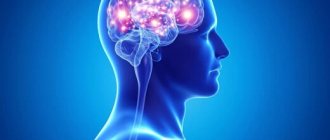Cognitive processes are a person’s ability to note events that occur, remember what needs to be done or bought, and listen to the interlocutor when he wants to tell something.
Cognitive processes
The text below will talk about what kinds of cognitive processes there are, what role they play in human learning, how mental direction processes can be improved, and much more.
What are cognitive or mental processes
The human brain is called upon to solve quite a lot of problems in different directions every day. Cognitive mental processes are those that are responsible for information processing of information that a person receives from the world around him. In other words, cognition is the knowledge of the environment, the person’s surroundings.
Mental psychological processes must interact harmoniously. This is necessary so that reality is adequately assessed by a person, then the response will be correct. This is why you can adapt to different life situations.
Mental processes are designed to interact with each other, but sometimes they occur separately. For example, some people whose speech is impaired, or whose memory does not perform its functions, solve math problems with ease and hear more sensitively. That is, if one function is disabled, the other continues to work.
What are cognitive processes
How does a consultation with a cognitive behavioral psychologist work?
From the name it becomes clear that cognitive behavioral psychotherapy is built around two topics: what the client thinks and how the client acts. The psychotherapist does not focus on an in-depth analysis of the client’s feelings, but on teaching him awareness and making daily behavior more effective. One of the main areas of work within therapy is cognitive vulnerability, which leads to stress. Therefore, during sessions, the psychotherapist tries to catch and change one or more “breakdowns” in thinking:
- Automatic thoughts (cognitions) that go unnoticed until the patient focuses on them.
- Unfounded conclusions made without supporting facts.
- Catastrophization that comes after one negative experience.
- Overgeneralizations derived from several cases or the actions of one person.
- Selective generalizations made on the basis of details taken out of context.
- Exaggeration/understatement or distorted assessment of an event (the tendency to blame oneself for defeats and explain success as simple luck).
- Egocentric thinking with a tendency to see criticism of oneself in any words or actions of others.
- Black and white thinking, classifying events as either absolutely bad or absolutely good.
- The tyranny of obligation, which is manifested by the beliefs “everyone owes me,” “everything should be my way,” “the whole world owes me.”
- Focus on the expected loss - the death of loved ones, the collapse of hopes, the breakdown of relationships.
These are all examples of non-rational thinking that a cognitive therapist will work with.
How does a CBT session work?
When it comes to psychotherapy sessions, most people imagine a picture: a client on a couch talking about problems, and a wise psychotherapist listening, from time to time writing something down in a notebook. But in a CBT session, everything happens differently. After searching for a therapist, concluding a contract, agreeing on a work topic, and discussing the number of sessions, the main work begins.
A psychotherapist is a patient, friendly partner who is not devoid of empathy. He not only examines the problem, but believes that every person, after appropriate training, will be able to look at the problem differently. Therefore, during sessions the psychotherapist:
- There will be a lot of explanation in detail about where problems come from, how they work, and what actions provoke them.
- He will give homework assignments that will have to be completed between sessions (for example, keeping a self-observation diary).
- Will select individual correction methods, experiments, training.
- Teaches the patient self-control, muscle and respiratory relaxation techniques.
- It can force the client to radically change his behavior (for example, a client with acrophobia, after preliminary preparation, will be taken to the stairs of a high-rise building in order to climb all the floors with him).
- May go out into the city with the client to help the client cope with an alarming or negative situation (behavioral experiment).
- Can combine techniques borrowed from other therapeutic areas (Gestalt approach, transactional analysis).
Take the empathy test
What a psychotherapist will not do is talk about how the psyche actually works or express it in obscure scientific terms. Also, a competent therapist will not undertake the correction of severe mental disorders without first consulting the client with a psychiatrist.
What does the client receive after CBT sessions?
- It will train the brain to detect its destructive thoughts and replace them with more adequate, constructive ones.
- Learn to communicate with facts more often, check the information received, and rely on your logic.
- Learn to change attitudes towards problematic situations in order to correct maladaptive behavior.
- He will understand how to teach the brain to learn: extract useful information from the outside world (and not just from the Internet), filter unnecessary information.
- Gain confidence that experiences and phobias can be dealt with in a more appropriate manner.
- Improves relationships with relatives, friends, colleagues.
- Improve your psycho-emotional state.
- Will be able to apply the acquired knowledge independently.
Cognitive psychology is not limited to proven techniques; it continues to grow year by year. There are many critics of this approach, but in 90% of cases, a cognitive behavioral therapist will be recommended to the client to quickly solve the problem.
Take a temperament test
What sciences study these processes?
There are quite a lot of sciences that study cognitive processes in psychology. This list includes neuroscience, philosophy, sociology, anthropology and linguistics. A large number of works, term papers and dissertations have been written on this issue.
Mechanical memory - what is it in psychology and how is it characterized?
Scientists from various scientific fields more than fifty years ago with their research contributed to a revolution in the issue of cognitive research. Because of this, mental processes began to be studied in even more depth.
For your information. In modern days, cognitive processes lend themselves to very global study, and the knowledge that can be obtained is successfully used in marketing and psychotherapy.
Causes of brain dysfunction
Impairment of cognitive functions is considered a sure symptom that disorders in brain activity have occurred. They can be functional, when such a phenomenon is temporary, and organic, characterized by irreversible processes.
The first category includes violations provoked by the following factors:
- overwork;
- severe or prolonged stress;
- emotional and mental overload.
Organic disorders occur against the background of various diseases, when the process of transmitting impulses in the brain is disrupted.
Such a violation can be caused by:
- diabetes mellitus;
- disorders in metabolism and homeostasis processes;
- hypothyroidism;
- hypertension;
- disorders of blood circulation in the brain;
- myocardial infarction;
- traumatic brain injury;
- Alzheimer's or Parkinson's disease;
- obesity;
- consuming large doses of alcohol or drugs.
Cognitive functioning disorders are classified according to severity. They can be:
- Light. In this case, the deviations are insignificant, the person has problems with memory and attention, as well as rapid fatigue.
- Moderate. About a tenth of these disorders gradually develop into Alzheimer's disease. Over time, symptoms increase, the ability to think and remember deteriorates, and speech problems develop.
- Heavy. As a rule, these disorders occur in old age and are characterized by mental disorders. A sign of this condition is disorientation in space, when a person gradually turns into a child, losing basic skills.
Attention! In the latter case, patients need care and constant intake of supportive medications. They are no longer able to care for themselves.
Types of cognitive processes
Low or basic
Sensation and perception
Determination - what is it in psychology
A sensation is something that is formed under the action of various stimuli, as well as the determination of signals from a person’s environment. He accepts them with the help of his feelings. This is how information is acquired from the environment around you. Data comes from the outside world, and sometimes from the human body. The process of perceiving a basic type includes some interpretation of the information received.
Attention! There is plenty of information around, yet each person has the ability, having received many different signal stimuli, to pay attention to what is really interesting to her. Some actions do not require attention. This is, for example, moving or chewing food. Others require attention without fail, such as speech or body language.
Some processes that are repeated often in life are done automatically. When learning to drive a car, it is difficult to immediately act in a coordinated manner, but then less and less effort is put in, as automaticity develops.
About memory
Human memory stores answers to a fairly large number of different questions. It encrypts data, it is able to save it, and then restore it if necessary. The classification of types of memory is as follows:
- Memory is short or short-term;
- Sensory type memory;
- Semantic type memory;
- Working memory;
- Autobiographical memory and others.
All of these species are capable of interacting or not. For example, if a person with amnesia remembers where he needs to go today, he may forget the name of his closest relative.
Attention and memory
Processes are complex and higher
Intelligence or mind
This concept means an ability that gives an individual the ability to solve a variety of problems. Some scientists have popularized in society the theory that there is no intelligence, but only different abilities that are used according to the situation or activity.
On a note. In order to skillfully deal with different circumstances in everyday life, many researchers emphasize the importance of emotional intelligence.
Thinking
Human thoughts are complex and heterogeneous. This process is necessary in order to make decisions, reason, solve problems, and think creatively.
In order to make these functions somewhat simpler, the human brain creates judgments and inferences. In order for mental processes to speed up, it is necessary to group events, people, objects, and so on.
Often people use shortcuts to make the thought process happen faster, and do not process information in general. In this case, there is some deviation from normal reasoning. For example, when someone thinks that they can predict the ending of a game in advance.
Speech
Speech is a complement to body language. With its help, you can reproduce entire words and sentences, use their combinations, the main thing is to give an outlet to emotions, feelings and attitudes towards the situation.
Speech can develop throughout life. Everyone's communication skills are different and can be improved with practice. When speech impairments are present, communication becomes difficult, but these impairments can be corrected with proper attention.
Thinking and speech
Cognitive therapy: applied work with thoughts and behavior.
In the 60s, American psychiatry professor Aaron Beck published a monograph in which he described a fundamentally new direction, based on experience different from the approach of traditional schools. Before this, representatives of classical psychiatry, psychoanalysis and behavioral therapy defended the claim that the root cause of a patient's psychological problems was outside his consciousness. Cognitive psychotherapy finds the beginning of a client’s psycho-emotional problems precisely in his mind.
Cognitive-behavioral therapy combined the knowledge of behaviorists and psychoanalytic methods into the general concept that, despite the pressure of psychological trauma, a person is able to change his behavior for the better. And all the problems are explained by the tendency to make incorrect conclusions , premises and assumptions that distort real information about the event. By understanding how a person perceives and processes information, one can understand the causes of specific psychological problems.
Take a personality type test
Cognitive Behavioral Therapy (CBT):
- Gives the expected effect in 5-7 sessions and saves the annual budget for visiting a psychotherapist.
- Works with specific client requests: stress, anxiety, depression, phobic symptoms, eating disorders, difficulties in relationships, communication.
- Shows greater effectiveness than drug treatment when dealing with obsessive-compulsive psychosis.
- Provides a reserve for the future: helps change behavior, become more flexible in the perception of others and ourselves.
- It is recognized as the most proven approach from a scientific and practical point of view.
- The only type of psychotherapy covered by health insurance in the EU. And in some countries it has the status of a state program.
- Used in clinical practice, psychological counseling, pedagogy, work with personnel, and criminology.
- Suitable for clients who are determined to solve a problem, as well as those who are accustomed to actively overcoming difficulties, are able to analyze the mistakes of the past, control the present, and make realistic forecasts for the future.
CBT is not the only global method; it does not deny or replace other therapeutic approaches. Rather, it effectively combines successful techniques from other methods, using different techniques for each disorder.
Functional diagram of the cognitive process
Long-term memory - what does it mean in psychology, how to improve it
This scheme is used to specify the cognitive process and consists of the following blocks:
- Initial information analysis, that is, the receptor area;
- That which concerns perception: hearing, sight, smell, taste, and so on;
- Memory is like a storage facility, which is quite complex. It contains knowledge and information;
- The area of representation. This is where the synthesis of perception occurs.
Methods
The main method of cognitivists is to replace the personal construct. Its development belongs to the American scientist J. Kelly and dates back to 1955, when the new direction had not yet been formed. However, the author’s work has largely become decisive for cognitive psychology.
Briefly, the personality construct is a comparative analysis of how different people perceive and interpret external information. It includes three stages. At first, the patient is given certain tools (for example, a thought diary). They help identify erroneous judgments and understand the causes of these distortions. Most often, they are states of passion. The second stage is called empirical. Here the patient, together with the psychotherapist, practices techniques for the correct correlation of phenomena of objective reality. This is done by formulating adequate arguments for and against, a system of advantages and disadvantages of behavioral models, and conducting experiments. The final step is for the patient to become more aware of his or her response. This is a pragmatic stage.
In short, Kelly’s cognitive psychology (or personality theory) is a description of the very conceptual scheme that allows a person to comprehend reality and form certain patterns of behavior. It was successfully picked up and developed by Albert Bandura. The scientist identified the principles of “observational learning” in behavior modification. Today, the personality construct is actively used by specialists around the world to study depressive states, phobias of patients and identify/correct the causes of their low self-esteem. In general, the choice of cognitive method depends on the type of mental behavioral disorder. These could be methods of decentering (for social phobia), replacing emotions, changing roles, or targeted repetition.
Application of cognitive processes in education
When receiving education in the classroom, a person is constantly faced with activities that test knowledge and abilities. There are a sufficient number of learning theories, but almost all take into account mental processes.
When reading, a person recognizes letters, recalls words, and compares them with what he already knows. He can process the information received in different ways. It depends on what you need to get in the end: prepare for an exam, just find a passage, and so on.
When writing, much the same thing happens. You need to not be distracted by extraneous stimuli, pay attention to the quality of what is written, do not neglect spelling, etc.
Improvement of mental processes
Drink coffee
Large amounts of coffee are harmful to the body, but researchers have found that caffeine does more than just keep you alert. It can help you concentrate on complex tasks, increases the efficiency of mental activity, and improves reaction. Coffee will not make a person smarter; this drink only temporarily improves brain function.
Coffee
Ways to improve
Cognitive development can be improved and trained throughout your life. To do this you need:
- Take care of health, which means a lot and is directly related to cognitive processes;
- Use technological advances such as intelligence games. They allow brain testing;
- Celebrate your successes;
- Develop critical thinking;
- Read.
All the processes described can indeed be significantly improved, and this is not too difficult to achieve with proper attention and practice.
Peculiarities
Incompetent people often equate behaviorism and cognitive orientation. However, as mentioned above, these are separate, independent disciplines. The first is focused only on observing human behavior and the external factors (stimulus, manipulation) that shape it. Today, some of its scientific provisions are recognized as erroneous. Cognitive psychology can be briefly and clearly defined as a science that studies the mental (internal) states of a person. It is distinguished from psychoanalysis by scientific methods (rather than subjective sensations) on which all research is based.
The range of topics covered by the cognitive direction includes perception, language, memory, attention, intelligence and problem solving. Therefore, this discipline often overlaps with linguistics, behavioral neuroscience, issues of artificial intelligence, etc.
Problems and discoveries
W. Neisser's work “Cognition and Reality,” published in 1976, identified the main problems in the development of the new discipline. The scientist suggested that this science cannot solve everyday problems of people, relying only on laboratory experimental methods. He also gave a positive assessment of the theory of direct perception developed by James and Eleanor Gibson, which can be successfully used in cognitive psychology.
American neurophysiologist Karl Pribram briefly touched on cognitive processes in his developments. His scientific contribution is related to the study of “brain languages” and the creation of a holographic model of mental functioning. During the last work, an experiment was carried out - resection of the brains of animals. After large areas were removed, memory and skills were preserved. This gave grounds to assert that the entire brain, and not its individual areas, is responsible for cognitive processes. The hologram itself worked based on the interference of two electromagnetic waves. When any part of it was separated, the entire image was preserved, although less clearly. Pribram's model has not yet been accepted by the scientific community, however, it is often discussed in transpersonal psychology.










